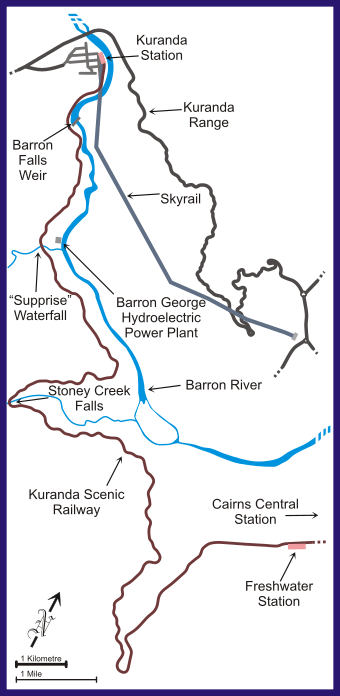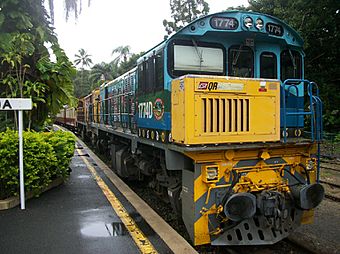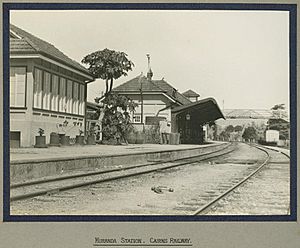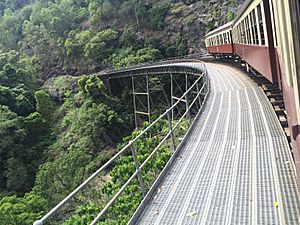Kuranda Scenic Railway facts for kids
The Kuranda Scenic Railway is a famous train journey in Queensland, Australia. It takes you on an amazing trip from the coastal city of Cairns up into the mountains. You'll travel through beautiful rainforests to the charming town of Kuranda. This special train is mostly for tourists now. It runs almost every day of the year, offering incredible views and a peek into history.
The railway line is about 37 km (23 mi) long. The trip usually takes about one hour and 55 minutes to go one way. This includes a stop at the famous Barron Falls.
 |
|

Kuranda railway station
|
|
| Overview | |
|---|---|
| Headquarters | Brisbane |
| Locale | Kuranda |
| Dates of operation | 1891–present |
| Technical | |
| Track gauge | 1,067 mm |
| Length | 37 km (23 mi) |
Contents
What to See and Do
The Kuranda Scenic Railway offers many exciting sights and activities. As you travel, a detailed commentary explains the railway's history. It also tells you about the amazing places you pass.
Beautiful Scenery
The train travels through the stunning Barron Gorge National Park. You will see lush rainforests and deep gorges. The train even stops at a special lookout point. From here, you get a fantastic view of the powerful Barron Falls. You will also pass by other smaller waterfalls. One of them is Stoney Creek Falls, which is very close to the train.
Kuranda Station and Town
When you arrive at Kuranda, you will see beautiful tropical gardens at the station. The town of Kuranda is just a short walk away. Here, you can visit a local zoo. You might even get to hold a koala or feed kangaroos! There are also markets, art galleries, and shops selling Aboriginal crafts.
Freshwater Station
Many people start their journey at Freshwater railway station. This station has an information center. There is also a gift shop where you can buy souvenirs. You can even enjoy a snack at a cafe located inside an old train carriage.
Building the Railway
The Kuranda Scenic Railway is an amazing engineering achievement. Building it was a very difficult task.
Early Construction
Work on the railway began in 1886. It took five years to complete the line all the way to Kuranda. The first passenger trains started running on June 25, 1891.
Overcoming Challenges
The railway climbs from sea level to 328 meters high. To do this, workers had to build 15 hand-made tunnels. They also built 37 bridges across difficult terrain. A huge amount of earth, about three million cubic meters, had to be dug out. Many workers faced dangers during this challenging construction.
Recent Events
The Kuranda Scenic Railway has been a tourist attraction for a long time. The first special tourist train ran in 1936. In 1995, the tracks needed major repairs after rocks fell onto them. In 2010, a landslide caused a train to derail. The service was temporarily closed for safety checks. It reopened a few weeks later.
Train Carriages
The carriages on the Kuranda Scenic Railway are designed to look like old trains. They have been carefully restored.
Standard Carriages
In the standard carriages, you will find rustic wooden interiors. The red leather seats are arranged in booths. Each booth has two seats facing each other. This design makes you feel like you have stepped back in time.
Gold Class Carriages
For a special experience, you can ride in the Gold Class carriages. In these carriages, you get refreshments and finger food served during your journey. It adds a touch of luxury to the historic ride.
Awards and Recognition
The Kuranda Scenic Railway is recognized as an important part of Queensland's history.
In 2009, it was named one of the "Q150 Icons" of Queensland. This award celebrates its role as an amazing "structure and engineering feat."
 | Shirley Ann Jackson |
 | Garett Morgan |
 | J. Ernest Wilkins Jr. |
 | Elijah McCoy |



